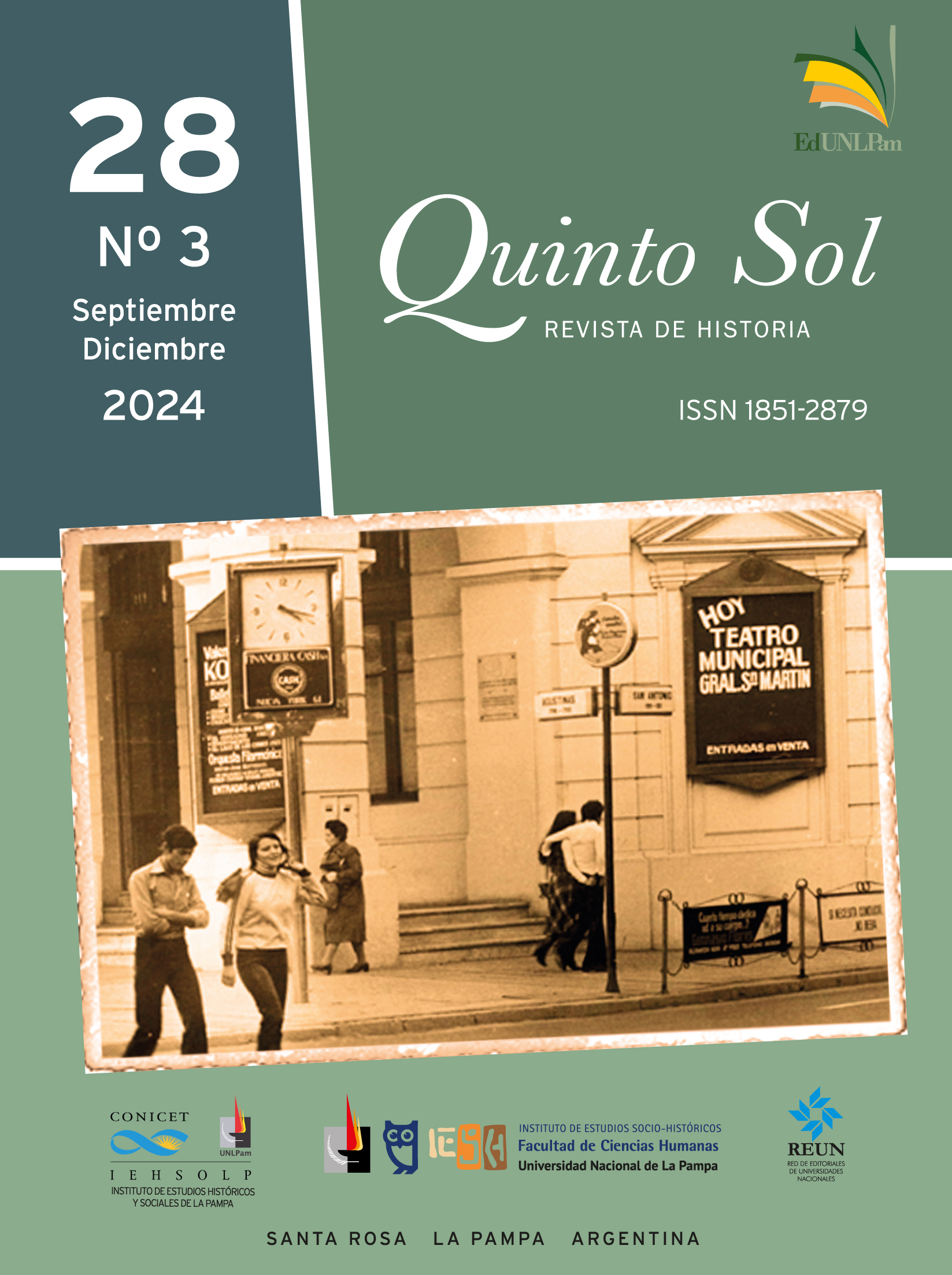"O fim da infância": as turnês internacionais do Teatro Municipal General San Martín durante a última ditadura militar na Argentina
Palavras-chave:
gerenciamento de teatros, ditadura, política internacional, gestão culturalResumo
Este estudo reconstrói e analisa o desenvolvimento das duas turnês internacionais realizadas pelo Teatro Municipal General San Martín (Buenos Aires, Argentina), sob a direção de Kive Staiff, no contexto da última ditadura militar (1976-1983): a chamada "Turnê hispano-americana", realizada entre abril e junho de 1980, e a visita à União das Repúblicas Socialistas Soviéticas em 1982. A partir do estudo dessas experiências, examinaremos como a gestão implementada pelo diretor do teatro foi marcada por negociações e transações entre o campo cultural e os vários interesses projetados pelo regime militar em nível internacional. Afirmamos que essas iniciativas contribuíram para a consolidação do projeto de gerenciamento da Staiff, tornando o teatro argentino visível além das fronteiras nacionais. Além disso, identificamos a instrumentalização dessas propostas culturais para a realização dos objetivos políticos perseguidos pela ditadura.
Downloads
Referências
Armony, A. (1999). La Argentina, los Estados Unidos y la cruzada anticomunista en América central, 1977-1984. Editorial Universidad Nacional de Quilmes.
Bourdieu, P. (2002). Campo de poder, campo intelectual. Montressor.
Canelo, P. (2008). El Proceso en su laberinto. La interna militar de Videla a Bignone. Prometeo.
Cristiá, M. (2021). AIDA. Una historia de solidaridad artística transnacional (1979/1985). Imago Mundi.
Dubatti, J. (2012). Cien años de teatro argentino: desde 1910 a nuestros días. Biblos.
Fernández Barrio, F. y González Tizón, R. (2020). De la ESMA a Francia: hacia una reconstrucción histórica del Centro Piloto de París. Folia Histórica del Nordeste, 38, 99-134. https://doi.org/10.30972/fhn.0384465
Franco, M. (2002). La “campaña antiargentina”: la prensa, el discurso militar y la construcción de consenso. En J. Casali de Babot y M. V. Grillo (Eds.) Derecha, fascismo y antifascismo en Europa y Argentina (pp.195-225). Universidad Nacional de Tucumán.
Fraser, N. (2014). Transnationalizing Public Sphere. Cambridge Polity Press.
Lvovich, D. (2020). Los que apoyaron reflexiones y nuevas evidencias sobre el apoyo difuso a la dictadura militar en su primera etapa (1976- 1978). Anuario IEHS, 35(2), 125-142.
Manduca, R. y Schcolnicov, E. (2023). Usos productivos de la escena oficial. Una mirada sobre las gestiones del Teatro Nacional Cervantes y del Teatro Municipal General San Martín durante la última dictadura militar (1976-1983) [manuscrito en proceso de edición]. Páginas, 16(42).
Manzano, V. (2019). Al compás del deshielo: cultura y política entre Buenos Aires y Moscú. Prismas, 23(2), 211-217.
Mark, S. (2010). Rethinking cultural diplomacy: The cultural diplomacy of New Zealand, the Canadian Federation and Quebec. Political Science, 62(1), 62-83. https://doi.org/10.1177/0032318710370466
Mogliani, L. (2001). Campo teatral y serie social. En O. Pellettieri (Dir.) Historia del teatro argentino en Buenos Aires. El teatro actual (1976-1983) (pp. 81-93). Galerna.
Oszlak, O. (1991). Merecer la ciudad: los pobres y el derecho al espacio urbano. Humanitas Buenos Aires Centro de Estudios de Estado y Sociedad.
Pallini, V. (1997). Un enfoque antropológico sobre políticas culturales: El Teatro Municipal General San Martín [tesis de licenciatura, Universidad de Buenos Aires, tesis no publicada].
Pellettieri, O. (2001). El perfil del Teatro Municipal General San Martín. En O. Pellettieri (Dir.) Historia del teatro argentino en Buenos Aires. El teatro actual (1976-1983) (pp. 199-202). Galerna.
Perinelli, R. (2023). La década de los 70. Teatro y dictadura [manuscrito no publicado]. Argentores.
Rapoport, M. (1988). La posición internacional de la Argentina y las relaciones argentino-soviéticas. En R. Perina y R. Russell (Eds.) Argentina en el mundo (1973-1987) (pp. 171-207). Grupo Editor Latinoamericano.
Risler, J. (2018). La acción psicológica. Dictadura, inteligencia y gobierno de las emociones, 1955-1981. Tinta Limón.
Russell, R. (1988). Argentina y la política exterior del régimen autoritario (1976-1983): una evaluación preliminar. En R. Perina y R. Russell (Eds.) Argentina en el mundo (1973-1987) (pp. 99-130). Grupo Editor Latinoamericano.
Rodríguez, L. G. (2015). Cultura y dictadura en Argentina (1976-1983): Estado, funcionarios y políticas. Anuario Colombiano de Historia Social y de la Cultura, 42(2), 299-325. https://doi.org/10.15446/achsc.v42n2.53338
Sanchís Muñoz, J. R. (2010). Historia diplomática argentina. Editorial Universitaria de Buenos Aires.
Schcolnicov, E. (2022) Teatro Nacional Cervantes y Teatro Municipal General San Martín durante la última dictadura militar argentina (1976-1983): sistemas de repertorio y prácticas de dirección escénica. Nuevo Mundo. Mundos Nuevos. https://doi.org/10.4000/nuevomundo.87453
Schenquer, L. (Comp.) (2022). Terror y consenso. Políticas culturales y comunicacionales de la última dictadura. Editorial de la Universidad Nacional de La Plata.
Yankelevich, P. (2010). Ráfagas de un exilio. Argentinos en México, 1974-1983. Fondo de Cultura Económica.
Downloads
Publicado
Edição
Seção
Licença
Copyright (c) 2024 Quinto Sol

Este trabalho está licenciado sob uma licença Creative Commons Attribution-NonCommercial-ShareAlike 4.0 International License.
Al momento de enviar sus contribuciones, los colaboradores deberán declarar que poseen el permiso del archivo o repositorio donde se obtuvieron los documentos que se anexan al trabajo, cualquiera sea su formato (manuscritos inéditos, imágenes, archivos audiovisuales, etc.), permiso que los autoriza a publicarlos y reproducirlos, liberando a la revista y sus editores de toda responsabilidad o reclamo de terceros.
Asimismo, los autores deben adherir a la licencia Creative Commons denominada “Atribución - No Comercial CC BY-NC-SA”, mediante la cual el autor permite copiar, reproducir, distribuir, comunicar públicamente la obra y generar obras derivadas, siempre y cuando se cite y reconozca al autor original. No se permite, sin embargo, utilizar la obra con fines comerciales. Los autores podrán establecer acuerdos adicionales para la distribución no exclusiva de la versión de la obra publicada en la revista (por ejemplo, situarlo en un repositorio institucional o publicarlo en un libro), con el reconocimiento de haber sido publicado primero en esta revista.
La publicación de contenidos en esta revista no implica regalía ni cargo alguno para los/as contribuyentes.
Quinto Sol adhiere adhiere a DORA (Declaration on Research Assessment) firmada en San Francisco, California, el 16 de diciembre de 2012, y a la Declaración de México (Declaración Conjunta LATINDEX - REDALYC - CLACSO - IBICT).






4.png)
2.png)












_(2).png)


2.jpg)



1.jpg)





